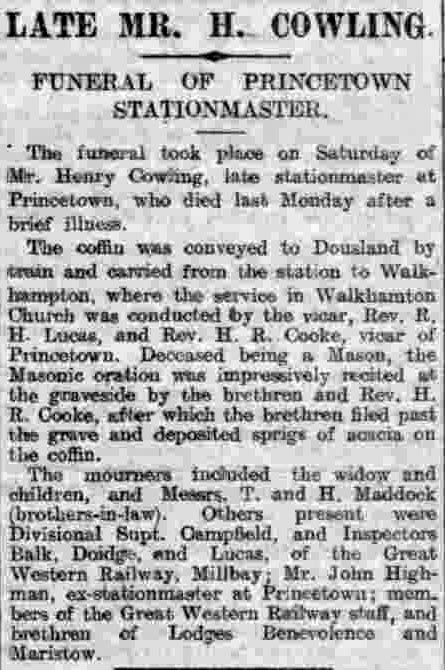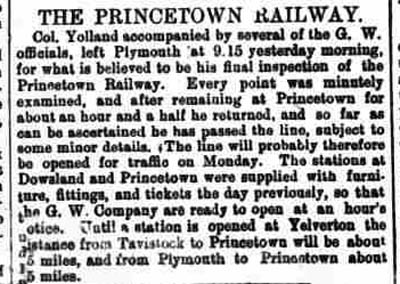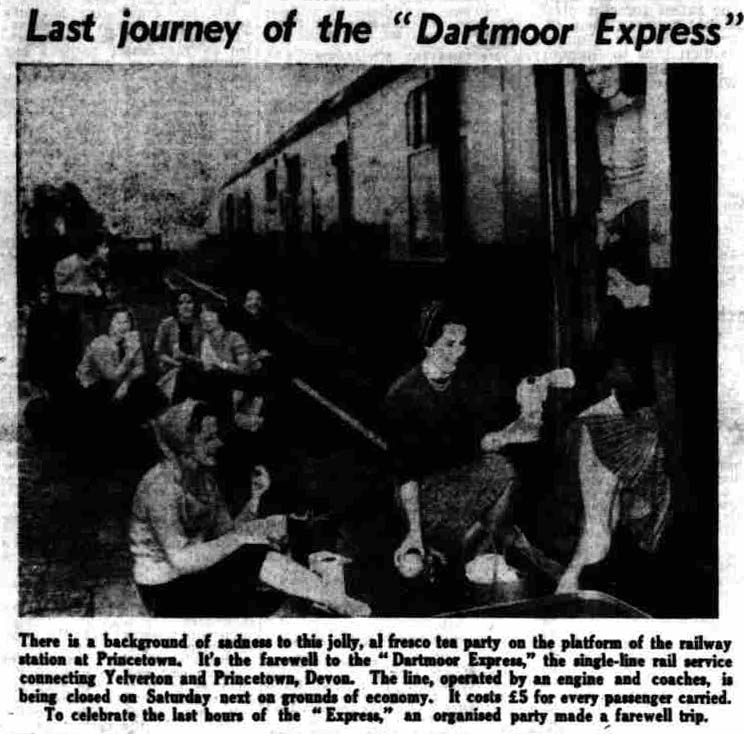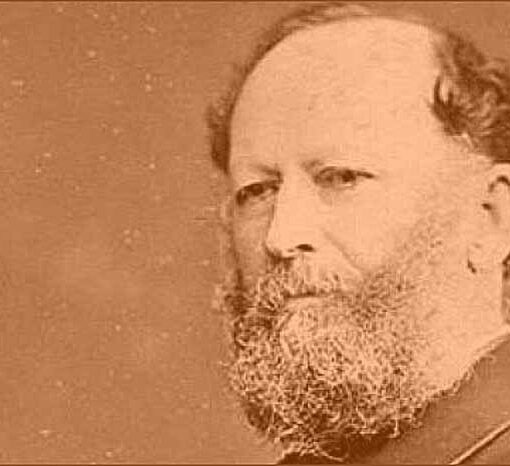 THE TAVISTOCK GAZETTE – Friday 17 August 1883
THE TAVISTOCK GAZETTE – Friday 17 August 1883
The article from The Tavistock Gazette dated Friday, 17 August 1883, covers The Opening of the Princetown Railway, a landmark event for the region. Here’s a deeper analysis and summary of the details related specifically to this new railway:
1. Preparations for the Opening Ceremony
- The residents of Princetown had eagerly awaited the opening of the railway, seeing it as a significant advancement that would bring better connectivity and economic growth to the area.
- Decorations and Festivities: Shops and homes in Princetown were decorated, and the atmosphere was festive as people prepared to celebrate the new line. However, there were delays due to final inspections by the Board of Trade, which created uncertainty about the exact date of the official opening.
- Despite the delays, the townspeople and organisers made last-minute arrangements to ensure that the celebration went ahead successfully.
2. The Inaugural Train Journey
- The inaugural journey began from Horrabridge on Wednesday, with a well-attended 12:15 p.m. train service that was patronised by several local dignitaries and residents.
- The journey was described as scenic, highlighting the picturesque landscape of Dartmoor. The article mentions notable sites along the route, including Walkhampton Down, which provided breathtaking views and added to the charm of the railway experience.
- Mr. W. Collier, a prominent local resident, was particularly impressed by the views and the engineering efforts that had made the route possible.
3. Route and Engineering Details
- The Princetown Railway connects Horrabridge with Princetown, passing through a rugged and beautiful landscape that posed engineering challenges during its construction.
- The line traverses various natural features, such as rivers, hills, and tors, making it a remarkable feat of engineering for the time. The article notes that the line passes close to significant landmarks like King Tor, Foggintor, and Swell Tor.
- The track required careful planning and construction, particularly in areas where the terrain was difficult. The line’s alignment and elevation changes were engineered to provide a smooth journey, although there were some steep sections.
4. Arrival at Princetown Station
- Upon arrival at Princetown Station, passengers were greeted by a lively scene, with crowds gathered to welcome the first official train. The station itself was decorated for the occasion, featuring flags and banners.
- The stationmaster, Mr. Hingston, played a key role in organising the reception. His efforts were praised, as he ensured that the event ran smoothly despite the earlier uncertainties.
- The platform was crowded with local residents, dignitaries, and even a brass band, which played celebratory music as the train pulled in.
5. Celebratory Events and Speeches
- Following the arrival of the inaugural train, there was a series of celebratory events held in Princetown. A formal luncheon was organised, attended by local officials, railway company representatives, and notable guests from the surrounding area.
- Speeches were given by key figures, emphasising the importance of the railway for the local community. The line was hailed as a “pioneer of civilisation and comfort” for the remote areas of Dartmoor, bringing new opportunities for trade, travel, and tourism.
- There was a strong sense of local pride, as the railway was seen as a testament to the perseverance and ingenuity of the engineers and workers who had built it.
6. Impact on the Local Community
- The article highlights the expected benefits of the new railway, suggesting it would be a boon for local industries, including farming, mining, and tourism. The ease of transporting goods and passengers was seen as a crucial step in the development of the region.
- The railway was anticipated to boost tourism to Dartmoor, allowing visitors easier access to the moor’s scenic attractions and historic sites.
- The connectivity provided by the line was also expected to improve communication and social ties between the remote moorland communities and the larger towns.
7. Challenges and Observations
- The article does not shy away from mentioning the challenges faced during the construction and the initial operation of the line. There were engineering difficulties, particularly with the rough terrain of Dartmoor, which made building the track a formidable task.
- Additionally, there were some delays and scheduling issues during the opening, attributed to the need for final inspections and approvals by the Board of Trade, highlighting the stringent safety regulations of the time.
Conclusion
The opening of the Princetown Railway was celebrated as a major milestone for the area, symbolising progress and modernisation. It connected Princetown, a remote Dartmoor settlement, with the broader railway network, making travel and transport more accessible for residents and visitors alike. The article captures the excitement and optimism of the local community, while also acknowledging the efforts and challenges involved in bringing the railway project to fruition.
OPENING OF THE PRINCETOWN RAILWAY.
Two or three weeks ago the good folk of Princetown decorated their thoroughfares and otherwise made preparations for appropriately celebrating the advent of that pioneer of larger civilisation and greater comfort—the iron horse. But, as it transpired, their arrangements were made somewhat prematurely, for up to last Friday night those most interested in the matter as intending passengers were in a glorious state of uncertainty as to when the new line would be open for traffic. On Saturday morning, however, the welcome intelligence was flashed that the line had been certified by the Board of Trade. So unexpected was this message that the contractor had not time to clear the main way of certain rolling stock which had been used in the construction of the line in time for the first train mentioned on the time-table consequently the train timed to leave Horrabridge at 9.5 am. on Saturday did not run, but the 12.8 p.m. train from that place was the first to start for Princetown, and it bore a very fair freight of passengers. Among them were Mr. C. E. Campton, the traffic superintendent ; Mr. Avery, the goods manager; and Mr. J. C. Inglis, the assistant engineer of the company ; Mr. A. P. Prowse, Mr. A. Watt, of Princetown, and Mr. P. Blowsy, the contractor for the stations. Chief Inspector Northcote had charge of the train, which was driven by the foreman engineer of the district, Mr. J. GoodelL Mr. Higman, from Launceston, brother to Mr. W. H. Higman, of Tavistook, has been appointed station-master at Princetown. Mr. Williams, who has the reputation of being a very careful driver, has been selected for the line. Inspector Chamberlain superintend the traffic.
As soon se it was learnt that the line had been certified the two committees at Princetown who had undertaken the arrangements in connection with the festivities as their gala day, set to week again to put their house in order.
The 12.8 p.m. train from Horrabridge on Wednesday was well patronised, and the passengers were all evidently charmed with the magnificent scenery which meets the eye almost without interruption throughout the journey. The beautiful valley in which Woodtown, the residence of Mr. W. F. Collier, forms a prominent feature, was especially admired, and the prospect from Walkhampton Down evoked many expressions of delight ; the huge grey boulders piled up as they are in a thousand fantastic; group; are in themselves well worth a railway trip to the heights of Dartmoor. The line from the junction at Yelverton to the Princetown Station is ten and a half miles long, and like the highway connecting Tavistock with Princetown is on the slope almost the whole of the journey. After passing along an embankment twenty feet high and more than a third of a mile in extent, which curves away from close proximity to Roborough Down, the train rune into a deep cutting, whose dungeon-like walls are gladly exchanged for a peep at the little village and parish church of Meavy on the one side, or their quality beautiful moorland view which presents itself in the opposite direction. After crossing the Devonport lest and getting on to the bank of the old Princetown tramway—in the vicinity of which the only fatal accident in connection with the construction of the line, took place, through the burial of two navvies by a falling away of debris—the line still gradually ascends to Dousland station, situate a mile and a half from Yelverton. A brief stoppage occurs here and then the train continues to thread its way uphill, skirting Yanadon Down, and taking a circuitous route until it reaches a point, above which the Devooport lest wends its way, while below runs the Plymouth lest, and from this spot a good view is obtainable of the Sheepstor valley. The Sheepstor and Lawrey roads are then crossed, and Peek Hill is reached. The main road to Princetown is crossed by a granite arch. Along Walkhampton Common a beautiful landscape opens out towards the west, taking in the river Tamar basked by the Cornish hills. Walkhampton church and Horrabridge may be seen ensconced below. A siding, with signals and other accommodation. has been made on Walkhampton Down for the convenience of that immediate locality, and it is thought that this arrangement will prove of much value to the neighbouring agriculturists for the conveyance of heavy goods.
En route the line passes Ingra Tor, King Tor, Foggen Tor, and Swell Tor. Scarcely a quarter of a mile below the latter is the lice which has previously been traversed, the train having in the meanwhile gone about three miles round the hill, and the line having in that distance risen 150 feet. About half a mile from the crossing of the Lawrey Road occurs the only decline on the way to Princedoms, the gradient being . 1 in 55. The line after this continues on the rise until the train reaches Princetown, 850 feet above Yelverton, and 1,550 feet above the level of the sea. The decorations at Princetown included some triumphal arches—one at the entrance to the station road, another near the Post Office, and a third opposite the Duchy Hotel. There was also a plentiful display of bunting. The general committee consisted of sixteen members, Capt. 0. W. Every, governor of the prisons, acting as chairman ; Mr. Alexander, chief clerk of the prison, secretary and Mr. W. Rowe, of the Duo y, treasurer. are informed that the last-named gentleman was the first to suggest that the opening of the line should be observed by some sort of celebration. Between £40 and £50 was raised from Princetown and the neighbourhood for the purpose, and it was decided to give the children of the village a free tea. A public tea was also provided for adults at the moderate charge of sixpence per head, the object of the committee in making this charge being simply to cover the out. A dinner was provided at the Duchy Hotel. The decoration committee consisted of Messrs. Rowe, Tooker, Davy, and Gardner.
The Prince of Wales, as proprietor of the Duchy property, contributed £5, and gave all the evergreens, and Sir Massey Lopes, M.P.. gave two guineas. The committee devoted £10 to decorations, £10 to the children’s tea, and £10 to fire-works, which were provided by Mr. J. Pain, of London. The tea was held in the new and commodious recreation-room recently built by the convicts.
In the course of the afternoon the children formed in procession, and bearing flags and halberds marched from one end of the village to the other, headed by the Tavistock Volunteer Band, under Bandmaster Martin, who played an excellent selection of music from time to time. In front of the Duchy the children were formed in a square, and upon the band ceasing to play. the juveniles united in singing some melodies, after which they gave three hearty cheers for the Princetown railway. Their voices had scarcely died away when down came a sharp shower of ram, and there is reason to fear that many an urchin received a damping before the procession reached the festive hall, was about a quarter of a mile distant. It needless to add that they thoroughly enjoyed the hospitality of their kind entertainers, end it may be observed that the adult portion of the population no less thoroughly appreciated the good and cheap tea to which they sat down. In the evening a display of fireworks took place, and a dance was afterwards held. Mr. White, the master-baker at the prisons, superintended the baking for the tee in a highly satisfactory manner. The tables were presided over by a number of ladies of the locality. The sports were held in a field near the recreation room, and consisted of fiat races, steeplechases. and donkey and wheel-barrow races, which created considerable diversion. J. Baker, of Tavistock, climbed the greasy pole, and secured the leg of mutton.
The station at Princetown is a thoroughly well built and handsome structure. It comprises a spacious general waiting-room,a ladies’ waiting-room and adjoining lavatories, a booking-office, and stationmaster’s apartment, the whole being complete in all their details. We noticed that the flushing apparatus was supplied by Mr. George Dann of Tavistock. The platform is in every way suited to meet any increased demands of traffic the larger portion of it is laid with vitrified brick. On the other side of the line stands the goods shed, with an office at one end, and behind this shed is an engine house which has a large tank. As Dartmoor is such a rough spot at times a long corrugated . iron abed has been constructed in which the outages employed on the line can be stored at night. The line is worked on the staff and block system. The signal-box is fitted up with two telegraphic instruments and fourteen levers, eight of which are only at present in use. There are two sidings and a turn-table. The chimney pieces of the station rooms are specially worthy of mention consisting as they do of enamelled slate which might almost be taken for marble.
Upwards of 170 passengers booked to Princetown by the first two trains on Wednesday. Mr. Higman, the station-master, is a most courteous official and promises to be the right man for the poet be holds. Chief inspector Northcott and Inspector Chamberlain were up and down the line throughout Wednesday, and Mr. Compton went to Princetown with them by the last train. At Dowsland Barn, near which a neat little station has been erected, the opening was celebrated by sports, a tea, and a dance. The tea was well attended, and the sports were entered into by a number of competitors with much zest.
Subjoined is a list at the principal events : Steeplechase for a mile, limited to readouts at Meavy, Walkhampton, and Sheepstor —l, J. Pope ; 2, H. Creber ; 8, W. Hamlyn ; a good race. Donkey race-1, J. Barons; 2, J. Sloman ; it created much fun as races of this description generally do. Sack race for boys under 15-1, Maddock ;2, Harding ;8, Sickle. Boys’ rape —m B 44 oo k, 1; Davis, 2 ; Maddeford, 3 ; ten started, good race. Steeplechase for a mile, open to all comers —1, Sandover, Plymouth ; 2, Tippett, Plymouth 8, Po Walkhampton. Flat race for half a mile—l, Tippett ; 2, Sandover; 3, Heard. About £20 was subscribed towards the prizes and the tea which was given to the school children. Mr. Barons, of Howland, acted as treasurer ; Mr. Shitlabeer, of the Rook Hotel, as judge ; and Messrs. Bickle and Rout, as secretaries.
About 140 passengers by the first two trains stopped at Dousland. Mr Laskey, who is a most civil official, is the station-master at this place.




